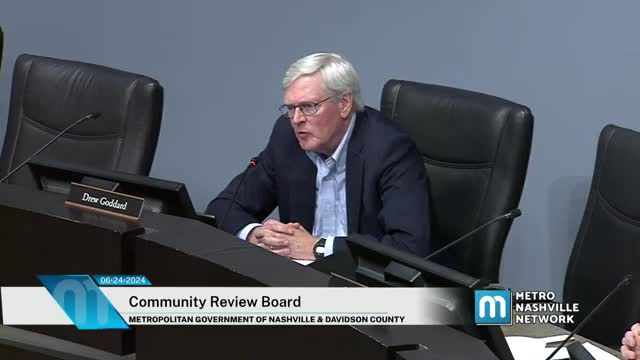Board in turmoil over controversial performance evaluations
June 25, 2024 | Community Review Board Meetings, Nashville, Davidson County, Tennessee

This article was created by AI summarizing key points discussed. AI makes mistakes, so for full details and context, please refer to the video of the full meeting. Please report any errors so we can fix them. Report an error »

In a recent government meeting, board members engaged in a heated discussion regarding the performance evaluation of Director Fitchard, highlighting significant disagreements over the assessment process and its implications for her merit increase.
The meeting revealed that some board members felt the evaluation submitted by member Goddard was overly critical and not reflective of Fitchard's hard work during a challenging year. Member Goddard expressed concerns about the need for improvement in certain areas but emphasized that his comments were intended as constructive criticism, not a personal attack. He acknowledged that the evaluation was not meant for public release and expressed regret over its reception.
The board debated whether to remove Goddard's evaluation from Fitchard's personnel file, with some members arguing that disregarding a fellow board member's assessment would undermine the integrity of the evaluation process. Legal counsel was consulted, and it was suggested that the board does not have the authority to simply disregard a member's evaluation without reviewing its content.
As discussions continued, it became clear that the board was divided on how to proceed. Some members advocated for a more collaborative approach to address the concerns raised in the evaluations, while others insisted on adhering to established processes. The meeting concluded without a definitive resolution, leaving the future of Director Fitchard's evaluation and merit increase uncertain.
This ongoing debate underscores the complexities of performance evaluations within government boards, particularly in times of organizational upheaval, and raises questions about how constructive feedback can be effectively communicated and received.
The meeting revealed that some board members felt the evaluation submitted by member Goddard was overly critical and not reflective of Fitchard's hard work during a challenging year. Member Goddard expressed concerns about the need for improvement in certain areas but emphasized that his comments were intended as constructive criticism, not a personal attack. He acknowledged that the evaluation was not meant for public release and expressed regret over its reception.
The board debated whether to remove Goddard's evaluation from Fitchard's personnel file, with some members arguing that disregarding a fellow board member's assessment would undermine the integrity of the evaluation process. Legal counsel was consulted, and it was suggested that the board does not have the authority to simply disregard a member's evaluation without reviewing its content.
As discussions continued, it became clear that the board was divided on how to proceed. Some members advocated for a more collaborative approach to address the concerns raised in the evaluations, while others insisted on adhering to established processes. The meeting concluded without a definitive resolution, leaving the future of Director Fitchard's evaluation and merit increase uncertain.
This ongoing debate underscores the complexities of performance evaluations within government boards, particularly in times of organizational upheaval, and raises questions about how constructive feedback can be effectively communicated and received.
View full meeting
This article is based on a recent meeting—watch the full video and explore the complete transcript for deeper insights into the discussion.
View full meeting
